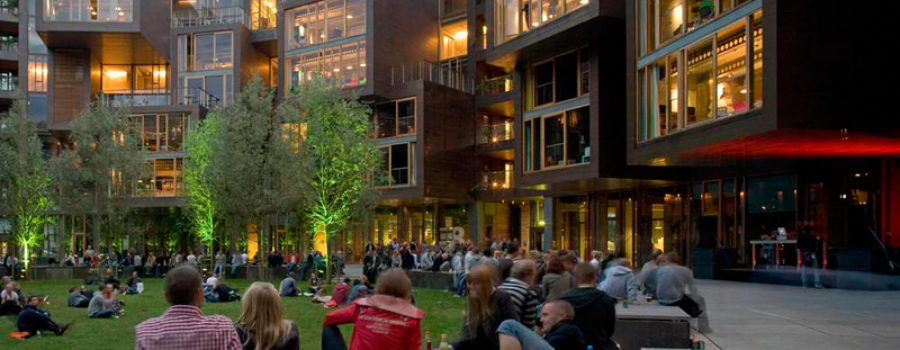Guide to Investing and Living in your Off Campus College Rental Property

Housing is one of the biggest expenses you and your family have to consider when you go off to college. While many universities will require you to stay on campus for at least one year, many students have the option to live off-campus, where the cost of housing is significantly cheaper. As real estate prices continue to climb in Boston, some student families are discovering the financial perks of an off-campus house hack.
House hacking is the use of creative strategies to generate income from your primary home. And this guide outlines some ways that college students in Boston can use these strategies to not only live for “free” but potentially generate a sizable ROI during their 4+ year stay here.
The Off Campus House Hacking Play:
- Buy a property “near” the university.
- Fill all the rooms with tenants or other prospective students.
- Either sell or hold the property after graduation.
Real Numbers
Here are some real numbers we can drawn from the current market.
On-Campus Dormitory
Here are the on-campus dorm rates for Northeastern University (Pioneer Institute Source).
So, over the course of 4 years, that yields a cost of $86,832.00 assuming no inflation in dorm price.
Sample House Hack
Let’s say you attend Northeastern University (NEU) and you need to be near the Orange Line (MBTA). Here’s a 3 bedroom / 1 bath condominium in move-in condition 9-minute walk from the Forest Hill T-Stop.

To buy the property, you’ll need typically 20% for down payment. At 5% interest rate, your monthly payment (including HOA) will be ~$2,500 a month.
| Purchase Price | $400,000 |
| Downpayment (20%) | $80,000 |
| Debt (80%) | $320,000 |
| PITI (Mortgage Payment, Insurance, Taxes, HOA Fee) | $2,500 |
If you live in one of the rooms, and rent out the other two rooms for $1000 a month each, your out of pocket is $600 a month or $28,000 over the course of 4 years.
| Monthly Expense(s) | Off Campus House Hack |
| PITI (Mortgage Payment, Insurance, Taxes, HOA Fee) | $2,500 |
| Utilities (split among roommates) | $100 |
| Total Expense | $2,600.00 |
| Rental Income ($1,000 per room per month) | $2,000.00 |
| Net Monthly Income | -$600.00 |
| Net Over 4 Years | -$28,800.00 |
But MOST IMPORTANTLY, over the course of the next 4 years, your property would appreciate at a modest rate of 7.7% year over year (based on historical 5 year gain for Condominiums in Jamaica Plain). At the same time, your debt would be paid down by your roommates. So as your debt shrinks while your property appreciates, if you decide to sell in 4 years, you could theoretically net $147,774.
| Appreciated Price in 4 Years | $538,174.11 |
| Debt (after 4 years of consistent principal payment) | $281,600 |
| Equity | $256,574.11 |
| Initial down payment | $80,000.00 |
| Payout from rent (over 4 years) | -$28,800.00 |
| Net Over 4 Years | $147,774.11 |
Here’s where you can see the stark contrast between off-campus house hacking (+ $148k) compared to dorm living over 4 years on campus (-$86k).
Where Do I Look?
Where you should look depends on your school, your desired proximity to the T, and budget. For the example above, we found a condo in the Forest Hill area of Jamaica Plain for a Northeastern university student. The commute adds up to 30 minutes. If you attend BU, you may look in lower Allston. If you don’t mind the longer commute, you can look further out in Quincy or Malden where the dollar stretches further in terms of space and amenities.
If you’re feeling extra adventurous, here are some other areas worthy of considerations around Boston:
Trade Offs
Of course, these are highly simplified numbers and scenarios. To live off campus and to manage your own condo means you’ll have to find roommates, be responsible with paying your mortgages, and the occasional repair/maintenance needs. Also, finding together $80-100k for a down payment on a house is no chump change. If you don’t have savings, you’ll likely need to take out additional loans (on top of your student loans) or ask for family support. There are however, fantastic first time buyer programs that will help with down payment assistance and may even reduce your interest rates. Lastly, campus life is far more convenient with on-site gyms, amenities, proximity to classrooms, and friends. In the end, these are the tradeoffs you’ll have to make.
Next Steps
Finally, becoming a homeowner is a pivotal moment in our lives. The home purchasing process can be a mystery for many folks so it’s important to study and understand the risks involved in house hacking – how to screen out bad tenants, how to collect rent, what to look for when inspecting a home and much more. Here’s a guide to house hacking in Boston that dives into greater detail. Good luck and happy house hacking!





